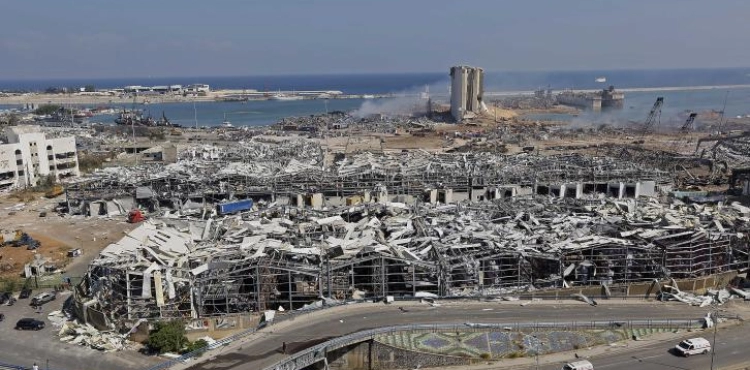The number of victims of the devastating Beirut bombing has risen to at least 135 people, while the number of injured people has reached 5,000, according to Lebanese MTV TV quoted Lebanese Health Minister Hamad Hassan on Wednesday.
In the same context, the Lebanese government declared a state of emergency in Beirut for a period of two weeks, subject to renewal, and requested the imposition of house arrest on all those responsible for the file of ammonium nitrate stored in the Beirut port, which caused the huge explosion that occurred on Tuesday in it and resulted in 135 martyrs.
In a statement to reporters after an exceptional meeting of the Council of Ministers headed by President Michel Aoun, Lebanese Minister of Information Manal Abdel Samad said that the cabinet discussed a series of measures to face the repercussions of the explosion and took several measures, most notably "adopting what was issued in the statement of the Supreme Council of Defense (...) in terms of declaring Beirut is a stricken city (...) and the declaration of a state of emergency in the city of Beirut for a period of two weeks ", which will continue from 4 to 18 August.
"The supreme military authority immediately assumes the authority to maintain security, and all armed forces are at its disposal."
Abdel Samad added that the Cabinet requested "the supreme military authority to impose house arrest on everyone who managed the storage of ammonium nitrate (2750 tons), guarded it, and examined its file, whatever it was, from June 2014 until the date of the explosion."
The Council of Ministers decided to form an administrative investigation committee headed by Prime Minister Hassan Diab, to manage the investigation of the causes of the disaster and submit a report to the government within a period of five days and then refer it to the competent judicial authorities.
He also asked the security services "to ensure that the crime scene is not tampered with to prevent the loss of its landmarks," and decided to take all necessary measures and measures for the sake of rebuilding Beirut.
The Council of Ministers has mandated the army and the High Relief Commission to conduct an immediate and comprehensive survey of the affected and affected areas, in preparation for the immediate payment of urgent compensation to those who are entitled to it according to priority and need.
And he asked the Ministry of Transport to secure import and export operations through other Lebanese ports.
The Council of Ministers decided to form a crisis cell to follow up the repercussions of the disaster, and to communicate with all countries and their embassies to secure the necessary aid and donations, and to establish a special fund for this purpose, and assigned the High Relief Commission to secure the accommodation of families whose homes are no longer habitable.
He also decided to create four government field hospitals.
On Tuesday, a huge explosion hit the Beirut port following a major fire that broke out in a store of high explosive materials confiscated years ago, according to what was suggested by General Security Director Major General Abbas Ibrahim.
Today, Lebanese Health Minister Hamad Hassan announced that the explosion resulted in 113 deaths and more than four thousand wounded, while Beirut Governor Marwan Abboud estimated the material losses to be between 3 and 5 billion dollars.












